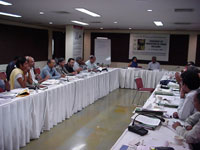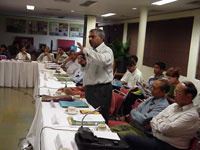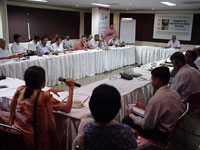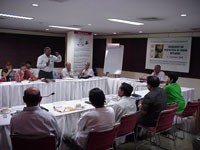October 4, 2002 Champions of urban water bodies assemble to seek ways to revive dying wetlands New Delhi, October 3-4, 2002: In a two-day workshop on 'Protection of Urban Wetlands', organised by Centre for Science and Environment, New Delhi, a core group was formed to promote the movement to revive dying urban wetlands. The team comprises of individuals from across the country who have made significant efforts to protect ailing lakes, ponds and tanks in their respective cities.
The following individuals and organizations participated in the workshop: Tej Razdan of Jheel Sanrakshan Samiti, Udaipur; VK Jain of Tapas, New Delhi; Bharat Jairaj of Citizen Consumer and Civic Action Group, Chennai; Ajay S Rawat of Society of Appeal for Vanishing Environments, Uttranchal; Kamini Jaiswal, lawyer representing the Green Kashmir group, Jammu and Kashmir; and Mohit Ray of Vasundhara, Kolkata, West Bengal. All of them presented their experiences in spearheading campaigns and mobilizing local communities to clean and recharge water bodies. "We wanted to highlight the work of these individuals and the groups they represent. Our objective is to motivate the urban population in India, to make them aware of the manifold uses that these decaying water bodies once served, and to emphasise the urgent need to take action revive them," said CSE Director Sunita Narain.
The mandate of the core group, constituted at the conclusion of the workshop, is to document facts on the ecologically fragile and sensitive urban wetlands and to assemble detailed case study dossiers in order to create a comprehensive national database -- a challenging and an unprecedented exercise. Their findings and reports are to be made public over the Internet. "Lack of access to scientific data and technology is a major hurdle faced by most activists. In order to revive a lake it is necessary to identify, first, the area it originally covered, and second, its catchment area. In a built-up area, it is almost impossible to accomplish both these tasks, as the government is very reluctant to impart information of any sort, " said Dr A Vaidyanathan, eminent scientist, and chairperson of CSE's National Water Harvesters' Network. Urban wetlands, indispensable to the existence of Indian cities, help in the storage of rainwater, supply water for domestic and agricultural use, recharge groundwater, serve as flood cushions, and act as a resource recovery area that treats impurities that enter these water bodies.
However, the conservation of these vital urban water bodies has slipped very low on the agenda of government bodies and policy planners, made evident by the fact that most urban water bodies are used either as dumping grounds for urban waste and sewage or are encroached and destroyed in the relentless pursuit for urbanisation. The fall-out: periods of acute water shortage in cities and at other times unimpeded flooding. Participants unanimously shared their anxieties about urban wetlands. High on the worry list was the apathy of government bodies and officials in protecting urban wetlands. This apathy shows up in the lack of basic civil amenities that has turned lakes into sewage and garbage dumps; the menace of encroachment and the unholy and unchecked nexus between the government officials and the builders' lobby. The dismal lack of access to scientific data and technology, the dearth of initiatives to identify endangered lakes, coupled with indifference to redress the crucial issue of recharge and control pollution were identified as core issues that need urgent attention. Most experts attending the workshop particularly decried the lack of stringent laws to protect urban water bodies, the multiplicity of government bodies and the complete absence of a national wetland law.
The workshop concluded with the observation that said a farsighted, long-term strategy was required to address the problem of the decline of wetlands. Participants said particular attention needs to be paid to first, employing innovative technologies to map lakes and their catchment areas, maintaining feeder canals, artificially recharge threatened water bodies, and check pollution. Second, firming up the existing legal frameworks, solving the problem of overlapping jurisdiction, disseminating information on public interest litigation and ensuring effective implementation of court directives was also needed, participants said at the meeting. Third, participants said there was urgency in drastically improving existing policies and the management of institutions that handle these issues and strengthening the role of the executive, the judiciary and – most importantly -- civil society. |
||||||||



